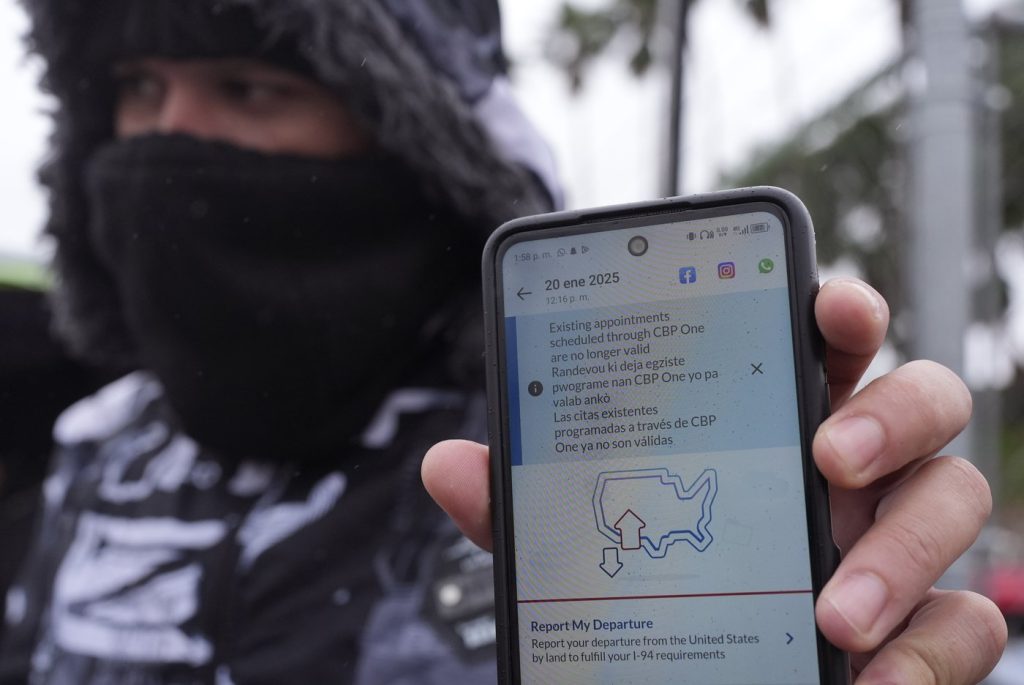McALLEN, Texas (AP) – An unusual incident has emerged in the realm of U.S. immigration, causing significant confusion and concern among individuals with temporary protections. Hubert Montoya, an immigration attorney and U.S. citizen from Austin, Texas, recounted his surprise when he received an email from the U.S. Department of Homeland Security requesting him to leave the country immediately or face possible deportation. He described the situation as "absurd."
This unexpected communication seems to be linked to the Trump administration's recent efforts to dismantle the Biden-era policy that initially allowed a wave of individuals to reside and work in the U.S. temporarily. U.S. Customs and Border Protection (CBP) is in the process of revoking two-year permits granted to beneficiaries who made appointments using an online application known as CBP One. Since its introduction in January 2023, the app facilitated the entry of more than 900,000 individuals at U.S.-Mexico border crossings.
Unlike other recent immigration policy cancellations, such as those affecting Temporary Protected Status and humanitarian parole, the revocation of CBP One permits has unfolded without the expected formal announcements. Rather than being accompanied by official notices in the Federal Register, as seen in past actions, cancellation notices began to appear in inboxes in late March 2023, alarming recipients, including U.S. citizens who had no reason to believe their status was at risk.
Notably, Timothy J. Brenner, another attorney born in Connecticut, received a similar notice instructing him to exit the U.S. The incident has raised concerns that the administration might be targeting immigration attorneys specifically. Brenner expressed worries that this could reflect a systematic harassment approach. CBP confirmed the issuance of termination notices for legal status tied to the CBP One program, though it did not provide specific figures on how many notices were distributed. They noted that not all beneficiaries were affected, and in some cases, notices may have been sent to unintended recipients if contact information for U.S. citizens was provided.
The online community has since erupted in discussions filled with fear and uncertainty, amplifying worries that the administration may be attempting to foster anxiety among beneficiaries. Brenner reported that three of his clients who received such notices opted to return to El Salvador rather than risk deportation. Hillary Li, counsel for the Justice Action Center, highlighted the confusion arising from the lack of information about the scope of the notifications and lamented the “problematic” nature of the situation.
During his presidency, Donald Trump suspended the CBP One app for new arrivals on his first day in office. However, those already in the U.S. operated under the assumption that they would remain protected until their temporary permits expired. The abrupt cancellation notices shattered this expectation, with some letters starkly stating, “It is time for you to leave the United States.”
Robyn Barnard, senior director for refugee advocacy at Human Rights First, remarked on the state of confusion surrounding the issue, emphasizing the emotional toll it takes on individuals who believed they were secure in their temporary arrangements amidst a wave of conflicting reports circulating through community channels.
Though some recipients of the CBP One notices are still within the one-year window for asylum claims or other forms of relief, the situation remains precarious. Moreover, various individuals have received notices contradicting the status they believed was secured through other temporary protections. A federal judge in Massachusetts recently intervened to halt deportations for over 500,000 individuals from nations including Cuba, Haiti, Nicaragua, and Venezuela, who had arrived after applying online with financial sponsors.
Maria, a 48-year-old woman from Nicaragua who supported Trump’s election, expressed her distress after receiving a notice demanding her departure. The notice felt like “a bomb” and left her paralyzed with fear. Speaking from Florida, Maria shared her intention to continue working in house cleaning while pursuing asylum despite the uncertainties now clouding her future.











